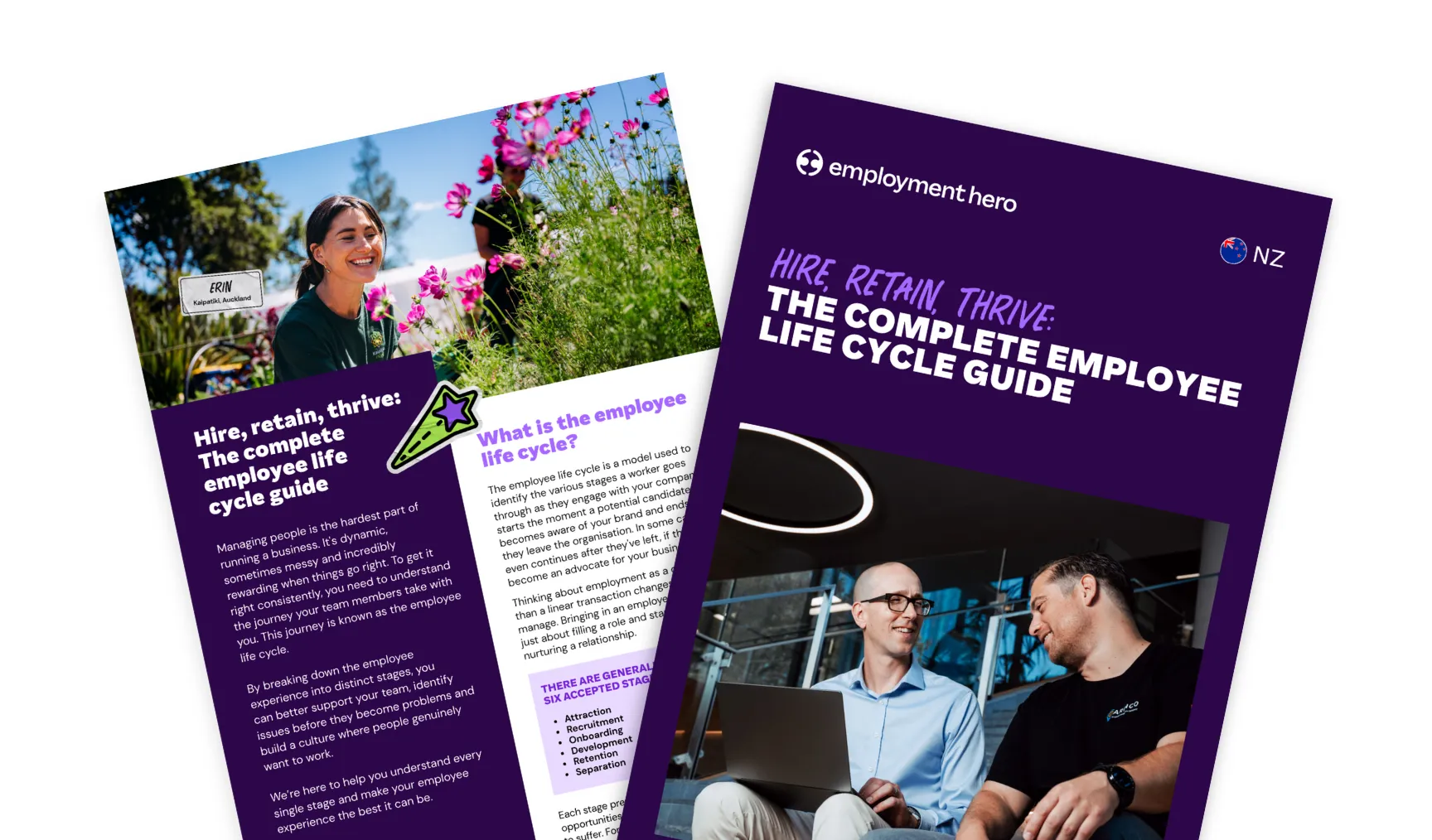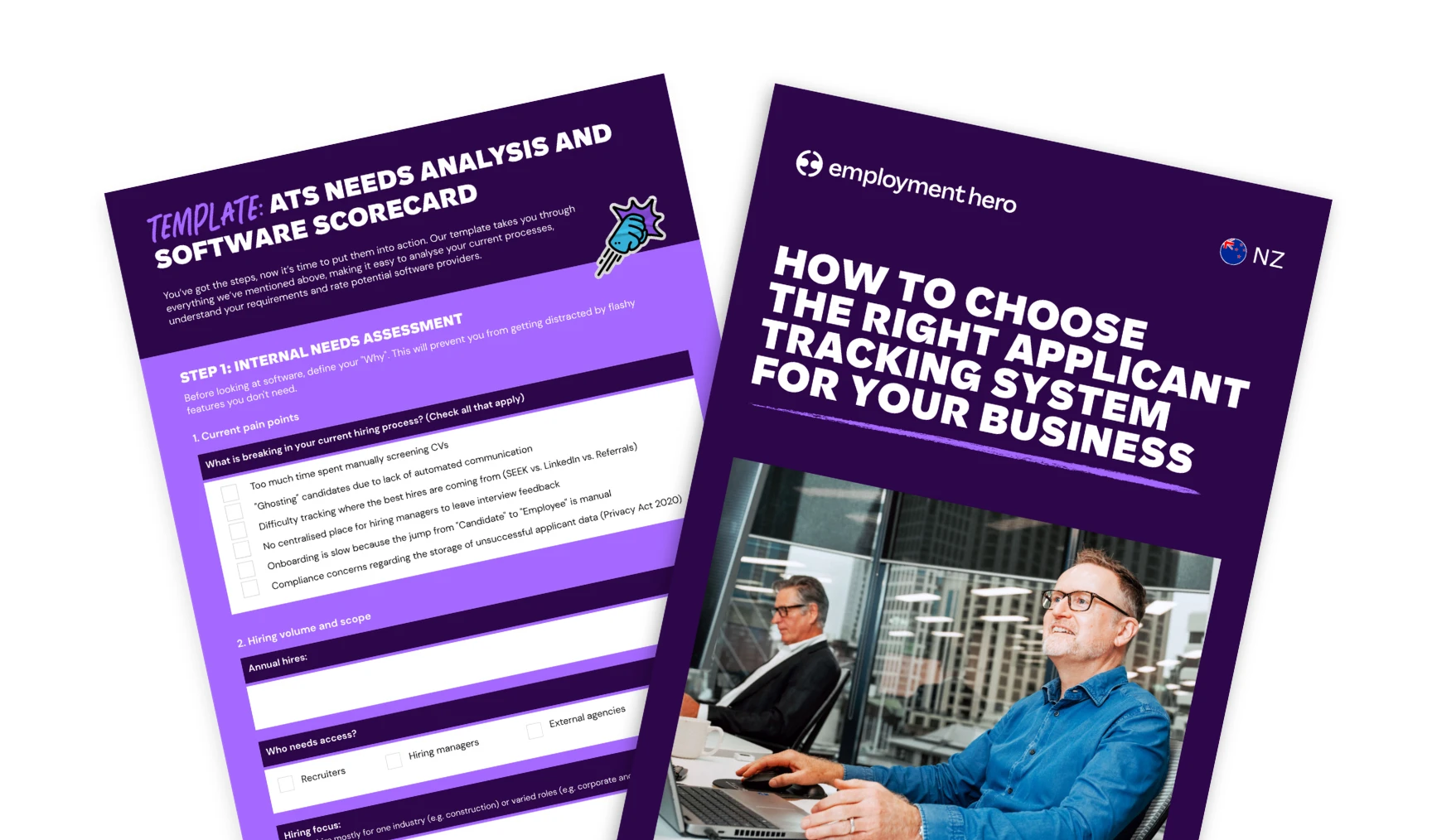90-day trial periods in New Zealand: What SMEs need to know
Published
90-day trial periods in New Zealand: What SMEs need to know
Published
1 min read
Bringing a new team member into a business can be a daunting step when you’re an employer. Everyone hopes they’ve made the right choice when they make an offer but it isn’t until the new employee begins the work that you get an idea of exactly how they’ll perform in a role.
That’s where the concept of the 90-day trial can come in useful for New Zealand businesses. If you’re interested in using these, check out our factsheet. In the factsheet, we’ve covered:
- Which employers are eligible to use trial periods
- Conditions of a trial period
- What to include in employment agreements
- Employee rights and responsibilities
- Key considerations in the case of dismissal
- When a trial period cannot be used
If you’ve got questions about 90-day trial periods in New Zealand, we’ve got the answers. Download the factsheet now.
What is the 90-day trial period in NZ?
90-day trial periods are an optional condition of employment that is available to New Zealand employers. When used correctly, trial periods allow for an employee to be dismissed within the 90-day period if they’re not performing to the expected standard, without the risk of the employee raising a personal grievance on the grounds of unjustified dismissal.
However, the trial period shouldn’t be treated as a casual test run for an employee. Employers should still stick to a fair process and ensure that they’re adhering to certain conditions that are required by Employment New Zealand.
 When does the trial period begin?
When does the trial period begin?
The trial period begins on the employee’s first day at work. That said, the trial period itself must be agreed to in the employment agreement before that day.
Can all employers implement trial periods?
Yes, according to the new Bill passed on 22 December 2023, New Zealand businesses of all sizes can use trial periods.
The only exceptions are:
- If the employee is part of a union and employed on a collective employment agreement that is inconsistent with a trial period.
- If the employee is an existing employee – they must be new to the business
Are employees paid during their trial period?
Yes – employees should be paid at least the current New Zealand minimum wage rate. Employees on a valid trial period also have all the same minimum rights as other employees, including leave, Kiwisaver, health and safety and rest breaks.
Key components of a valid trial period
To be valid, every trial period must meet the following requirements:
- The trial period must be agreed to in the employment agreement before the employee starts work, and signed by both parties. The employee must be notified of the inclusion of the trial period clause in the employment agreement.
- The trial period cannot exceed 90 days in duration, although it can be shorter.
- An employee on a trial period should receive all the benefits that a permanent employee would, including annual leave and sick leave.
- The employment agreement must specify a notice period.
- The notice period should be agreed upon between the employer and employee in good faith.
- The agreement states that the employer has the right to dismiss the employee with notice, and the employee is prohibited from initiating legal proceedings regarding their dismissal.
 What happens after the trial period ends?
What happens after the trial period ends?
If the employer is happy with how the employee has been performing, they should notify the employee that their employment will continue following the trial period. Then employment continues past the trial period as it would any other employee.
If the employer is unhappy with the employee’s performance and is considering dismissal, it’s crucial that they act on this ahead of the conclusion of the trial period. Before an employer makes any moves, it is also imperative that they seek professional advice before taking any action on termination.
They do not have to give reasons for dismissal, although it is seen as good practice to give an employee an idea why. A notice period still applies, and employers must inform the employee of that upon dismissal.
 Can employees appeal against a termination during the trial period?
Can employees appeal against a termination during the trial period?
Employees on a trial period cannot bring a personal grievance on the grounds of unjustified dismissal.
However, employees on a trial period are still entitled to bring a personal grievance on other grounds, including harassment, employment contract breaches and discrimination. Additionally, where an employee believes they were placed on an invalid trial period, they are able to bring a claim for unjustified dismissal.
Download our 90-day trial period factsheet
Using a trial period for new employees in a business can be useful, but it is crucial that it is used correctly. Failure to meet compliance requirements can become a real issue for a business in the long run.
Check out our factsheet to understand your employer responsibilities.
Disclaimer: The information in this article is relevant as at 22 December 2023, and has been prepared by Employment Hero Pty Ltd ABN (11 160 047 709) (Employment Hero). The views expressed herein are general information only and are provided in good faith to assist employers and their employees. The Information is based on data supplied by third parties. While such data is believed to be accurate, it has not been independently verified and no warranties are given that it is complete, accurate, up to date or fit for the purpose for which it is required. Employment Hero does not accept responsibility for any inaccuracy in such data and is not liable for any loss or damages arising either directly or indirectly as a result of reliance on, use of or inability to use any information provided in this article.
Register for the factsheet
Related Resources
-
 Read more: Hire, retain, thrive: The complete employee life cycle guide
Read more: Hire, retain, thrive: The complete employee life cycle guideHire, retain, thrive: The complete employee life cycle guide
Learn the full scope of the employee life cycle and how it impacts recruitment, onboarding and retention.
-
 Read more: How to choose the right ATS for your business
Read more: How to choose the right ATS for your businessHow to choose the right ATS for your business
Learn how to choose the right applicant tracking system. Explore features, vendor questions, red flags, and comparison tips in this…






















